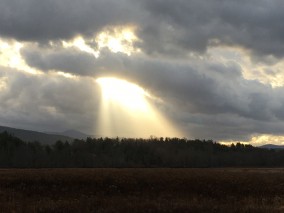We Are At a Climate Crossroads of Opportunity
- Article Published At:
- Green Energy Times
- Date of Publication:
- January 20th, 2021
We are at a climate crossroads. This is a time of real opportunity, when we can let go of the past, and do what needs to be done to deal with the climate, sustainability and extinction crises. The time for change is now, when new directions are possible.
The key questions to ask is: “Where do we want our Earth to be: 1 year, 5 years and 10 years from now? What must be done to get us there, and are we willing to do it?”
This is critical because we are decades behind in reducing our greenhouse gas (GHG) emissions, which are driving accelerating climate change.
We are at a crossroads for two reasons: The Trump regime has ended, and this coming year we should see the control of the pandemic with new vaccines. The pandemic has shown us the benefits of global reduction of GHGs and reduced atmospheric pollutants, but we need the GHG reductions to continue at about 3-4% for the coming decade.
Considerable progress has been made in understanding the science of ongoing climate change. We follow in detail the rapid warming of the Arctic, the changing ocean circulations and the melting of the reflective ice that leads to more ocean evaporation. We now understand how the Antarctic ice sheets are melted from below by warmer deeper ocean water. Icebergs then slide into the ocean contributing to rising sea level. Underwater robots study the processes in detail.
The past year was however a disaster for the planet, with record tropical cyclones and hurricanes, record fires raging in the western U.S., and record temperatures continuing to melt the Arctic and the permafrost in northern Siberia. One town on the Arctic Circle reached 100F near the summer solstice. The Gulf coast states were hit by storm after storm, and Nicaragua was devastated by two category 4 hurricanes just two weeks apart. On November 1st the strongest super-typhoon ever hit the Philippines with 195mph winds. In late November, northern Somalia, struck by the strongest cyclone of the satellite era, got a year’s rainfall in 48 hrs.
The Earth was close to a new record temperature in 2020. Tragically, as climate extremes are accelerating, millions of species are becoming extinct, threatening much of life on Earth. None of this news is encouraging as long as GHGs are increasing. However it also appears that if we can zero out our GHG emissions in the next decade or two the recovery of the Earth’s ecosystems will be much faster than we thought a decade ago.
Although the past two decades and especially the past four years have set us back, we have the technology to zero out our GHG emissions. This past decade there has been tremendous technical progress and falling costs in the development of solar and wind power, battery storage systems, and electric and hybrid vehicles.
However fossil fuels have also become cheaper and their use continues, because society has been unwilling to use financial and legal strategies to actively push the fossil fuels out of the economy. So the destruction of the Earth continues as it has for decades. We have the technical capability for transformation, but lack the political and economic will.
The political arguments will now change, but other obstacles will not.
One issue is that most of our economic system places no value on the future, so we are content to exploit and destroy our children’s future to increase current profits. A related issue is that the consumer growth economy is central to our capitalism. But with nearly 8 billion people on the planet, we have taken over nearly all the resources, and this exploitation is destroying the Earth’s living ecosystems. Figures are uncertain, but it appears we are losing about 30% of the Earth’s species each decade. A third global issue is that those with money and power control decisions as well as resources, and the poorer communities around the world suffer because they have no voice.
So what are we willing to do? We have to value the survival of the Earth and its ecosystems, and the lives of our children and grand-children more than we value the rights of the rich and powerful, and the consumer growth economy which is driving the current exploitation. We have the technical capability, and the renewable transition is vastly cheaper than trying to pay for the trillions of dollars of catastrophic damages from climate change in the next few decades.
Will we really act?
